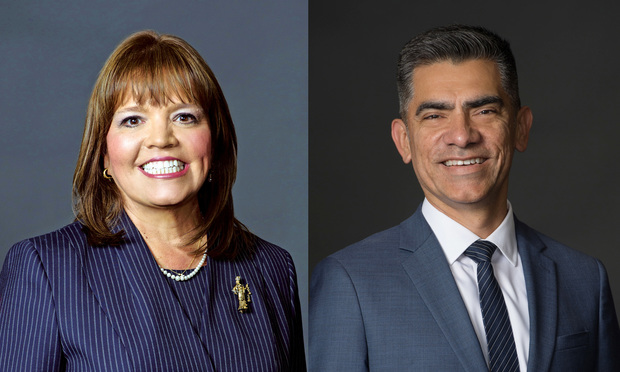Battle for the Texas Bar: After Losing by 37 Votes, Candidate in Bar President-Elect Race Calls for Recount, Runoff
Pablo Almaguer of Edinburg requested a recount and argued for a runoff election because Sylvia Borunda Firth of El Paso won the State Bar of Texas president-elect election with 49.31% of the vote, rather than a majority vote.
June 01, 2020 at 06:00 PM
3 minute read
 From left: Sylvia Borunda Firth and Pablo Almaguer.
From left: Sylvia Borunda Firth and Pablo Almaguer.
The State Bar of Texas announced that El Paso lawyer Sylvia Borunda Firth, who garnered 37 more votes than her opponent, has won the race for president-elect.
But Firth's opponent, Pablo Almaguer of Edinburg, is calling for a recount and runoff election, arguing that neither candidate won a majority of the vote, which is required in the Texas Bar policy manual.
Out of 19,298 cast ballots, Firth won 9,515 votes, or 49.31%, while Almaguer won 9,478 votes, or 49.11%, according to election results.
Also, 1.58% went to write-in candidates.
'No Candidate Met That Mark'
If Firth's election stands, she would be the first Hispanic woman to serve as Texas Bar president, and the first El Paso attorney elected to the position.
"The reason I threw my hat in the ring is I very much wanted to see diversity in leadership at the state bar," said Firth, adding that diversity, to her, meant gender, race, and also practice areas and geography in Texas. "Far West Texas—it's really hard to get elected from here. Several people have tried. I really wanted to take the opportunity to represent this part of the state."
There has never been an election contest or challenge in Texas Bar history, although races have come very close in the past, said an email by spokesman Lowell Brown. In 2008, Roland Johnson won election with 49.92% of the vote, compared with 49.27% to Claude Ducloux, he explained.
In an email Sunday, Almaguer requested a recount from Texas Bar president Randy Sorrels and executive director Trey Apffel. He argued that the Texas Bar's policy manual contains a provision that the president-elect must win election by a "majority of all votes cast by members."
"No candidate met that mark," Almaguer wrote. "The policy manual mandates a runoff election."
Low Turnout
Almaguer, director of private bar and government relations at Texas RioGrande Legal Aid, said in an interview that the bar's nominations and elections subcommittee would review his arguments and make a decision.
He said the attorneys who voted for him have been asking questions about the issue of the lack of a majority vote, and he felt they deserved an answer. Almaguer added that he planned to accept whatever interpretation of the bar policy manual that the subcommittee decided upon.
"I'm not going to file anything in court, and I'm not going to challenge anything," he said.
Firth said she doesn't think a runoff election is appropriate.
"I think it does a disservice to the bar, to challenge on that basis," Firth said. "There's no way there is a runoff with the same two candidates."
The coronavirus made for a strange election season for the Texas Bar. As the state closed down in March, both candidates ceased in-person campaigning. Because the bar's election vendor is headquartered in New York City, and its staff could not come to the office, the bar chose to eliminate paper ballots and move to online-only voting, with an extended voting period.
The voter turnout was only 18%, which is the lowest turnout in the past five years. That's a drop of six percentage points compared to the 2019 turnout of 24%.
This content has been archived. It is available through our partners, LexisNexis® and Bloomberg Law.
To view this content, please continue to their sites.
Not a Lexis Subscriber?
Subscribe Now
Not a Bloomberg Law Subscriber?
Subscribe Now
NOT FOR REPRINT
© 2025 ALM Global, LLC, All Rights Reserved. Request academic re-use from www.copyright.com. All other uses, submit a request to [email protected]. For more information visit Asset & Logo Licensing.
You Might Like
View All
Vinson & Elkins Expands Environmental Team with Chair of Texas Commission on Environmental Quality
4 minute read
Nondisparagement Clauses in Divorce: Balancing Family Harmony and Free Speech
6 minute read
Houston Trial Lawyer Mary-Olga Lovett Leaves King & Spalding to Open Boutique
3 minute read
Trending Stories
- 1'A Death Sentence for TikTok'?: Litigators and Experts Weigh Impact of Potential Ban on Creators and Data Privacy
- 2Bribery Case Against Former Lt. Gov. Brian Benjamin Is Dropped
- 3‘Extremely Disturbing’: AI Firms Face Class Action by ‘Taskers’ Exposed to Traumatic Content
- 4State Appeals Court Revives BraunHagey Lawsuit Alleging $4.2M Unlawful Wire to China
- 5Invoking Trump, AG Bonta Reminds Lawyers of Duties to Noncitizens in Plea Dealing
Who Got The Work
J. Brugh Lower of Gibbons has entered an appearance for industrial equipment supplier Devco Corporation in a pending trademark infringement lawsuit. The suit, accusing the defendant of selling knock-off Graco products, was filed Dec. 18 in New Jersey District Court by Rivkin Radler on behalf of Graco Inc. and Graco Minnesota. The case, assigned to U.S. District Judge Zahid N. Quraishi, is 3:24-cv-11294, Graco Inc. et al v. Devco Corporation.
Who Got The Work
Rebecca Maller-Stein and Kent A. Yalowitz of Arnold & Porter Kaye Scholer have entered their appearances for Hanaco Venture Capital and its executives, Lior Prosor and David Frankel, in a pending securities lawsuit. The action, filed on Dec. 24 in New York Southern District Court by Zell, Aron & Co. on behalf of Goldeneye Advisors, accuses the defendants of negligently and fraudulently managing the plaintiff's $1 million investment. The case, assigned to U.S. District Judge Vernon S. Broderick, is 1:24-cv-09918, Goldeneye Advisors, LLC v. Hanaco Venture Capital, Ltd. et al.
Who Got The Work
Attorneys from A&O Shearman has stepped in as defense counsel for Toronto-Dominion Bank and other defendants in a pending securities class action. The suit, filed Dec. 11 in New York Southern District Court by Bleichmar Fonti & Auld, accuses the defendants of concealing the bank's 'pervasive' deficiencies in regards to its compliance with the Bank Secrecy Act and the quality of its anti-money laundering controls. The case, assigned to U.S. District Judge Arun Subramanian, is 1:24-cv-09445, Gonzalez v. The Toronto-Dominion Bank et al.
Who Got The Work
Crown Castle International, a Pennsylvania company providing shared communications infrastructure, has turned to Luke D. Wolf of Gordon Rees Scully Mansukhani to fend off a pending breach-of-contract lawsuit. The court action, filed Nov. 25 in Michigan Eastern District Court by Hooper Hathaway PC on behalf of The Town Residences LLC, accuses Crown Castle of failing to transfer approximately $30,000 in utility payments from T-Mobile in breach of a roof-top lease and assignment agreement. The case, assigned to U.S. District Judge Susan K. Declercq, is 2:24-cv-13131, The Town Residences LLC v. T-Mobile US, Inc. et al.
Who Got The Work
Wilfred P. Coronato and Daniel M. Schwartz of McCarter & English have stepped in as defense counsel to Electrolux Home Products Inc. in a pending product liability lawsuit. The court action, filed Nov. 26 in New York Eastern District Court by Poulos Lopiccolo PC and Nagel Rice LLP on behalf of David Stern, alleges that the defendant's refrigerators’ drawers and shelving repeatedly break and fall apart within months after purchase. The case, assigned to U.S. District Judge Joan M. Azrack, is 2:24-cv-08204, Stern v. Electrolux Home Products, Inc.
Featured Firms
Law Offices of Gary Martin Hays & Associates, P.C.
(470) 294-1674
Law Offices of Mark E. Salomone
(857) 444-6468
Smith & Hassler
(713) 739-1250






